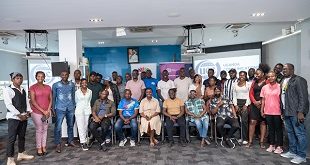
Kampala, Uganda | THE INDEPENDENT | Africa has been declared free of wild poliovirus, four years since a case was last reported on the continent. This marks the eradication of the second virus from the face of the continent since smallpox 40 years ago.
The last case of wild poliovirus in the region was detected in 2016 in Nigeria. Since 1996, polio eradication efforts have prevented up to 1.8 million children from crippling life-long paralysis and saved approximately 180,000 lives. The viral disease is transmitted from person to person mainly through a faecal-oral route or less frequently through contaminated water or food and multiplies inside the intestines.
The declaration was made by the African Regional Certification Commission for Polio eradication on Tuesday ending an exhaustive decades-long process of documentation and analysis of polio surveillance, immunization and laboratory capacity of the region’s member states which included conducting field verification visits to each country.
“This is a momentous milestone for Africa. Now future generations of African children can live free of wild polio,” said Dr Matshidiso Moeti, WHO Regional Director for Africa. “This historic achievement was only possible thanks to the leadership and commitment of governments, communities, global polio eradication partners and philanthropists, she said.”
But Dr Moeti cautioned that the continent must stay vigilant and keep up vaccination rates to avert a resurgence of the wild poliovirus and address the continued threat of vaccine-derived polio.
In 1996, African Heads of State committed to eradicating polio during their 32 Ordinary Session of the Organization of African Unity in Yaoundé, Cameroon. At the time, polio was paralyzing an estimated 75,000 children annually on the African continent.
In the same year, Nelson Mandela with the support of Rotary International jump started Africa’s commitment to polio eradication with the launch of the Kick Polio Out of Africa campaign. Mandela’s call mobilized African nations and leaders across the continent to step up their efforts to reach every child with the polio vaccine.
Dr Alfred Driwale, the programme manager of the Uganda National Expanded Programme on Immunization says the eradication of wild poliovirus will save the country at least five billion Shillings annually.
“Uganda eradicated polio more than 10-years ago. But due to cases being reported in neighbouring countries, we have been carrying out reactive campaigns. With the eradication, it means that we shall be saving funds that we have been using to immunize people every time a case is reported,” Dr Driwale said.
He however adds that the health ministry will continue carrying out surveillance where they will critically examine all causes of paralysis reported in health centres to make sure that none is cases by polio. Only two countries in the world- Pakistan and Afghanistan are yet to eradicate the disease.
While the eradication of wild poliovirus from the WHO African region is a major achievement, 16 countries in the region are currently experiencing outbreaks of Vaccine-Derived Poliovirus type 2, which can occur in under-immunized communities.
The 16 countries include Angola, Benin, Burkina Faso, Cameroon, Central African Republic, Chad, Côte d’Ivoire, the Democratic Republic of the Congo, Ethiopia, Guinea, Ghana, Mali, Niger, Nigeria, Togo and Zambia.
While rare, vaccine-derived polioviruses cases can occur when the weakened live virus in the oral polio vaccine passes among under-immunized populations and over time, changes to a form that can cause paralysis. However, if a population is adequately immunized with polio vaccines, it will be protected from both wild polio and circulating vaccine-derived polioviruses.
Dr Pascal Mkanda, the coordinator of the WHO Polio Eradication Programme in the African region says that with the innovations and expertise that the polio programme has established, “we can sustain the gains, post-certification and eliminate cVDPV2.”
While there is no cure for polio, the disease can be prevented through the administration of a simple and effective vaccine. That is why efforts are underway across every country to rapidly boost immunity levels in children and protect them from polio paralysis.
*****
URN
 The Independent Uganda: You get the Truth we Pay the Price
The Independent Uganda: You get the Truth we Pay the Price


